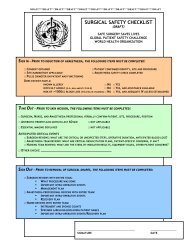The Essentials of Patient Safety - Clinical Human Factors Group
The Essentials of Patient Safety - Clinical Human Factors Group
The Essentials of Patient Safety - Clinical Human Factors Group
You also want an ePaper? Increase the reach of your titles
YUMPU automatically turns print PDFs into web optimized ePapers that Google loves.
<strong>The</strong> <strong>Essentials</strong> <strong>of</strong> <strong>Patient</strong> <strong>Safety</strong><br />
<strong>Patient</strong> involvement in patient safety<br />
<strong>Patient</strong>s and their families have a critical, privileged perspective on many aspects <strong>of</strong><br />
healthcare. <strong>The</strong> patient may not, <strong>of</strong> course, understand the technical and clinical issues<br />
at stake, but they do observe and experience the kindnesses, the small humiliations,<br />
the inconsistencies in care, the errors and sometimes the disasters. In the case <strong>of</strong><br />
people with chronic illnesses they become experts not only on their own disease but<br />
on the frailties, limitations and unintentional cruelties <strong>of</strong> their healthcare system. <strong>The</strong><br />
trouble is when we are patients, while we have great insight into the frailties <strong>of</strong> the<br />
healthcare system, we find it astonishingly difficult to make our voice heard,<br />
particularly where errors and safety are concerned.<br />
Even an experienced senior doctor can find it hard to make their voice heard<br />
when dealing with hospital staff caring for themselves or their family. Don Berwick,<br />
currently head <strong>of</strong> Medicare in the United States, has movingly described his<br />
experiences <strong>of</strong> being with his wife Ann during her treatment for a serious autoimmune<br />
condition (1). In his account Don stresses the good will, kindness, generosity and<br />
commitment <strong>of</strong> the healthcare staff but, even after two decades <strong>of</strong> grappling with the<br />
quality and safety <strong>of</strong> healthcare, he was appalled at the operation <strong>of</strong> the healthcare<br />
systems.<br />
<strong>Patient</strong>s, whether they have a clinical background or not, can provide<br />
important safety information. Saul Weingart and his colleagues at Dana Farber<br />
Cancer Institute in Boston (2, 3) interviewed 229 patients in hospital, who were both<br />
willing and able to participate, asking them three general questions:<br />
<br />
<br />
<br />
Do you believe that there were any problems with your care during this<br />
hospitalisation<br />
Do you believe that you were hurt or stayed in the hospital longer than<br />
necessary because <strong>of</strong> problems with your care<br />
Do you believe that anyone made a mistake that affected your care during this<br />
hospitalisation<br />
From these simple five minute interviews patients identified a host <strong>of</strong> process failures<br />
such as problems with diagnosis, medication, procedures, clinical services (such as<br />
radiology, phlebotomy and laboratory) and service quality. In a second study the<br />
team found that patients reported many serious untoward events that were not found<br />
in the medical record; however record review also revealed incidents and adverse<br />
events that were not reported in patient interviews. Both record review and patient<br />
reports are necessary to obtain a reasonably complete picture <strong>of</strong> the harm from<br />
healthcare.<br />
<br />
<strong>Patient</strong>s are usually thought <strong>of</strong> as the passive victims <strong>of</strong> errors and safety failures, but<br />
there is considerable scope for them to play an active part in ensuring their care is<br />
effective, appropriate and safe. Instead <strong>of</strong> treating patients as passive recipients <strong>of</strong><br />
medical care, it is much more appropriate to view them as partners or co-producers<br />
with an active role (4). <strong>The</strong> degree to which patients can be involved will vary<br />
considerably depending on the nature and complexity <strong>of</strong> the treatment and the degree<br />
<strong>of</strong> technical knowledge required to understand the treatment process. Most<br />
importantly it will depend on the extent to which each person feels willing and able to<br />
37








